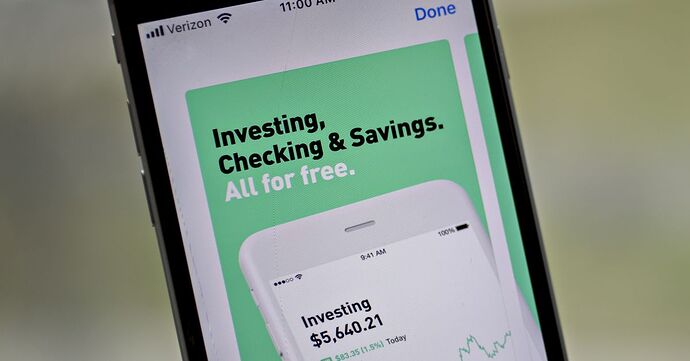Thanks. I guess I’m just too dense. I still can’t see how Melvin Capital going bust could affect Robinhood directly.

Google salvaged Robinhood’s one-star rating by deleting nearly 100,000...
It’s not outside Google’s purview to delete these posts.
Thanks. I guess I’m just too dense. I still can’t see how Melvin Capital going bust could affect Robinhood directly.
Citadel bailed out Melvin. Supposed to be ties with Citadel.
Depending on “how bust” Melvin goes – they could presumably leave the prime broker holding some of their losses.
But they announced they got out on Tuesday. If that were a lie, clearly that would be illegal manipulation?
And we know they always tell the truth!
To be fair, there are/were other hedge funds with large short exposure. Melvin was the worse but not the only one.
I suspect they were stretching the truth.
Seems like they found a market inefficiency that anyone could have found and used it to make money. Good for them.
Robinhood denying they sold out people of their long positions, despite various screenshots and testimony of investors who claimed this happened.
Brokers really don’t have the right to sell your positions without permission unless you’re violating a margin call, but that can’t happen without margin.
Local Congressman Paul Gossard is a dentist and an idiot
Brokers really don’t have the right to sell your positions without permission unless you’re violating a margin call,
Some of the reports were of 1/29 ITM call options, closed out early (let’s assume they don’t have enough funds to exercise). Can’t they also claim they just changed their policy on when they close calls before expiration and they had to liquidate them earlier due to volatility?
RH has also lost lawsuits and been assessed fines previously for doing things they “don’t have the right to do”
is a dentist and an idiot
Are you an anti-dentite?
Also it sounds like you elected him then? ![]()
Remember Interactive Brokers took a bath on WTI in April. I think they have a right to be careful. Interactive Brokers’ Loss From Negative Oil Prices Swelled to $104 Million
Remember Interactive Brokers took a bath on WTI in April.
That article says it was their own mistake that caused the loss. Were they supposed to settle the contracts at negative amounts or would they have expired worthless? (I don’t know, I’m just reading the linked article)
IB software didn’t handle the negative oil prices and it allowed people to buy for a few pennies with margin in proportion to their contracts or notional, but risking, as it turned out $40/contract of downside to -$40. This resulted in customer defaults that IB had to cover to their futures counterparty.
Here’s a good rundown on the Robinhood liquidity problem and how broker firm capital requirements can be very large when they have big unsettled customer trades in volatile stocks. Basically RH got a margin call from the DTC for settlement risk that’s why banning more buying was done to stop it from getting worse. They also drew all their credit lines and are raising $1B in new capital from their investors.
Basically RH got a margin call from the DTC for settlement risk that’s why banning more buying was done to stop it from getting worse. They also drew all their credit lines and are raising $1B in new capital from their investors.
So are you saying RH has a pass, but IB’s Peterffy specifically saying they had plenty of extra capital and did it to protect the middlemen is a completely different motivation?
So are you saying RH has a pass, but IB’s Peterffy specifically saying they had plenty of extra capital and did it to protect the middlemen is a completely different motivation?
I don’t know about a pass, but RH had a clearing firm level capital problem, not a problem with the trading itself.
Peterffy is right that IB has tons of extra capital. I think the mechanism of DTC defaults is backstopped by all the brokerage firms collectively so if RH ends up defaulting for some reason on their customer trades to the other brokerage counterparties, IB might be on the hook for part of that. He worries a lot about systemic risks to the financial system, but from what I understand about the GME/RH situation, it seems misplaced to me.
Google deleting all the bad reviews RH deserved on their app.

It’s not outside Google’s purview to delete these posts.
Anyone concerned that the vulnerabilities of brokerage firms like RH that were exposed by this will lead to more regulation of investing activity due to social media? Seems like a perfect storm for some politicians. I’ve already read Omar proposing a 0.1% tax on trades. I wouldn’t be surprised if they looked at regulating more capitalization requirements or clearing house deposits.
This is solid entertainment otherwise.
I have every expectation that SOME kind of regulation will come from this, just so they can look like they “did something”.
Though I will say this all seems like an inevitable consequence of zero-friction trading (free trades at pretty much all brokerages now) and fractional-share trading (i.e. zero barrier to entry that makes share price irrelevant)
Both of those seem like they remove significant “damping” from the system.
EDIT: not saying I want to go back to the old days of full service brokers and $50 trade fees, or anything like that – but a nominal trading tax is probably “more useful” to all of us than a fee charged by the brokerages. (i.e. presumably pay for government level services for broader benefit than simply lining brokers pockets)
Though that said – the mechanism that allows for “free” trading (i.e. brokerages selling order flow) becomes WAY less valuable once the people buying the order flow can’t engage in high frequency trading at low or zero friction.